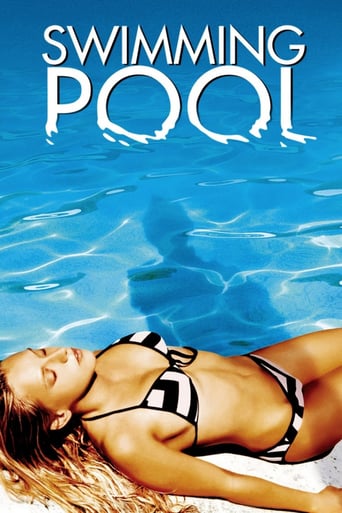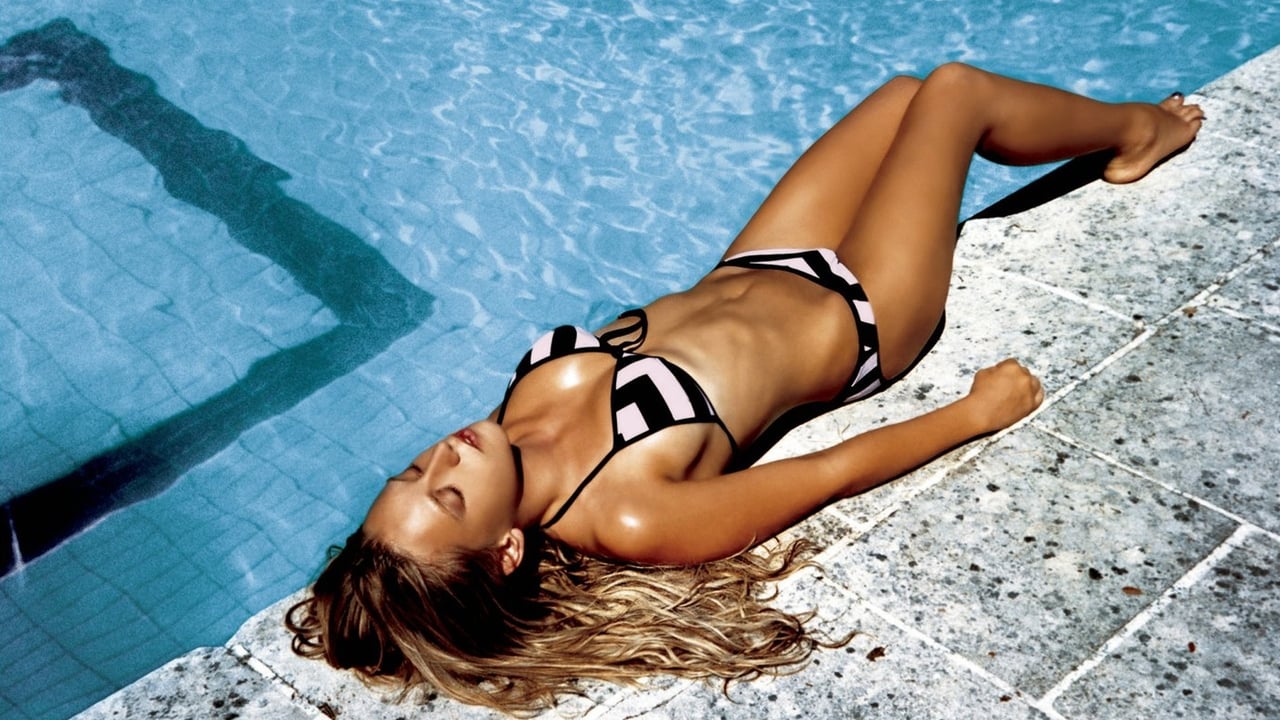rogerdarlington
Essentially this is a French film: it was written and directed by a Frenchman François Ozon and it was shot by a French crew almost entirely on location in the south of France. But the lead actress is British and half of the dialogue is in English. Charlotte Rampling plays Sarah Morton (actually the name of Rampling's sister who killed herself at the age of 23), an English crime novelist who wants to craft something different. She is offered the use of her publisher's home in rural France where unexpectedly she comes across his daughter Julie played by Ludivine Sagnier. The two women are utterly different and the film - a slow-burning thriller - explores the developing relationship between them and its mysterious consequences with an ending that is highly ambiguous. We think of French films as often involving nudity and there is plenty on show here. Both actresses are beautiful and sexy although, at the time the film was made (2003), Rampling was in her late 50s and Sagnier in her early 20s.
brchthethird
SWIMMING POOL is a laid-back, sensual thriller with top-notch performances by Charlotte Rampling and Ludivine Sagnier. The story is about a British crime novelist, Sarah Morton (Rampling) who, lacking in inspiration, is allowed by her publisher to vacation at his French home to begin work on a new novel. Trouble starts when his daughter shows up unexpectedly and begins to turn things upside down for the uptight novelist. Gradually, Sarah starts to come out of her shell and then things take a turn I didn't expect (which I'll leave unsaid). The best thing about this incredible film are the great performances given by Charlotte Rampling and Ludivine Sagnier (as Sarah's publisher's daughter). They bring so much depth to their characters and every scene they share is a treat to watch. Also of note is the eerie, mysterious score which does an excellent job at setting the tone of the film. The film is also shot very well, with lots of beautiful location shooting on the French countryside. The only negative I could find was a scene about two thirds of the way through when Julie (Sagnier) brings home a waiter who Sarah happens to know, and they have a little dance party. It was more the choice of song than anything, although the scene was rather awkward in and of itself. Still, this only reminds me why I love French films, especially thrillers like this one. Highly recommended.
hall895
Swimming Pool is one of those films which leaves you questioning everything you've seen. Once it concludes you immediately start running the whole thing back in your mind, trying to piece it all together. It's a film which entertains you while also compelling you to think. That's a very good combination. It is a slow film, taking its time in setting itself up and really taking its time in fully revealing itself. But while there may be moments where you wish the film would pick up the pace it certainly manages to hold your interest throughout. And in the end it is clearly worth having taken the sometimes slow journey towards its intriguing conclusion.The story follows middle-aged English novelist Sarah Morton who, with a bad case of writer's block, has holed up at her publisher's French country house. Alone there Sarah can clear her mind and find her inspiration. But she won't be alone for long, her peaceful serenity disrupted when her publisher's young, nubile and quite oversexed daughter Julie shows up to stay in the house with her. To say that Sarah and Julie don't hit it off would be putting it mildly. Furious with the intrusion Sarah calls her publisher to complain but oddly seems unable to reach him. Little oddities continue to pile up. What exactly is going on here? The film is not going to give up its secrets that easily, you have to wait to the end. But there is really good entertainment to be had as the plot weaves its way to the finish. Sarah does find her inspiration. Where she finds that inspiration and what it leads to is both surprising and smart. Writer/director François Ozon thought his story out very well and executed it in fine fashion.The film's smart, compelling and very intriguing story is played out very well by Charlotte Rampling playing Sarah and Ludivine Sagnier playing Julie. There are other characters who come in and out of the story but it is really all about Sarah and Julie. And both Rampling and Sagnier do excellent work portraying these two very different women. Sarah is cold, stern, reserved. Julie is free, open, wild, full of life. And prone to quite often putting her bodily assets on full naked display. As much as acting the part looking the part was important for the character of Julie and Sagnier is certainly up to the task there. The initial clash between the two main characters is inevitable. But as the story evolves the characters do too and Rampling and Sagnier capture the evolution wonderfully. As Sarah and Julie come to understand each other a little better you would think things in the home would become a little more peaceful. In reality it is at this point where the drama and tension get ratcheted up. The film has some thrills in store. In the end the film gives you much to appreciate. And much to think about.
bandw
(Spoilers!) This film is not for those who want everything spelled out for them, since it is open to many interpretations. I add mine here.The movie gave me some insight into how fiction writers create their work, since it delves into the things that spark an author's imagination. The writer in this movie is Sara Morton (Charlotte Rampling), a popular British author of crime fiction. When we first meet her, Sara is a bit burned out and when her publisher offers her his country house in the south of France as a temporary retreat to get her back on track, Sara accepts.We get to know some things about Sara as we see her settle into the house in France. She dresses rather plainly and is quite reserved. Even though she speaks French well, she is not very adventuresome, sticking close to the house with occasional visits to the local village. She seems to be immune to the French obsession with food, settling for fruit and yogurt. She hopes for a more intimate relation with her married publisher, John, and is disappointed when he reneges on coming to join her for a weekend on occasion. Nearing sixty, Sara seems sexually frustrated and very much alone.The movie moves into a different gear when Sara starts to conceive of a storyline for her next novel that involves an imagined visit from Julie, a fictitious version of John's daughter. For many reasons I think that there never was a real Julie. For one thing, when still in London in John's office, Sara asks him, "Would you come and visit me?," John answers, "Well, I have got my daughter." He didn't say, "I have got my younger daughter," or "I have got one of my daughters," but, "I have got my daughter." This indicated to me that John indeed had only one daughter. Sara never talks to John directly about Julie. When Julie is seen talking to her father and passes the phone to Sara, John is not on the line, and when Sara calls back, he is out of the office. If John's French daughter frequented his country home, wouldn't John tell her that Sara would be staying there? Also, the ending makes sense if there was never a Julie, since Sara's waving goodbye is seen as waving goodbye to her imagining of John's daughter for her fiction as well as her imagining of John's real daughter, whom we see at the end she has never met. Indeed I think John's comment, "I have got my daughter," was probably the initial spark for Sara's vision of an attempt at a novel.Most of what we see is Sara's conception of her novel. It is interesting how certain real events weave themselves into her fiction. Franck, the waiter at a local café becomes a character in the fiction, fantasized as one of Julie's lovers, but also fantasized by Sara as a lover for herself. Engaging to see how fiction writers may actually become involved with their imagined characters in a non-trivial way. Sara identifies with her imagining of Julie's mother to the point of wearing a dress she ascribes to her. Perhaps like actors, authors can temporarily take on the identity of their characters.Sara's fiction moves on as a rather unbelievable crime story that has Julie killing Franck and covering up the murder. At this point I think that Sara became disenchanted with what she was writing as being just another crime story; she had indicated earlier in the movie that she was tired of writing such stories. And this story seemed particularly uninspired and unbelievable (I think I have never seen a more artificial looking rock than the one Julie uses for the murder). I think that Sara, realizing the inanity of where her story was headed, then abandoned that whole effort in favor of writing the novel that Julie's mother supposedly had written. At one point Sara is sharing a meal with Julie and, after asking Julie a lot of questions, Julie remarks that Sara is showing a little too much interest in her life. Sara then says, "I am not so much interested in you as I am in your mother." I think that signaled the turning point when Sara started thinking about jettisoning the Julie story in favor of writing the romantic novel that Julie's mother supposedly had written.As to what Julie represented for Sara is anybody's guess I think. Was she an imagining of what Sara would like to have been as a young woman? Was Julie realized as part autobiography? What is real and what is imagined in a work of fiction seems to be a tricky thing. Perhaps a good deal of fiction is an expression of wish fulfillment on the part of the author.There are many elements in the movie whose interpretation is totally up for grabs. For example, what is the meaning of the egg that we see in several scenes that is constructed of several interlocking pieces? Is it a puzzle to be cracked, like this story? Is it the symbol of a new beginning for Sara? Or is it simply an ornamental knickknack? And what is the significance of the dark red inflatable mattress? How does the caretaker fit into the puzzle? Ozon and his screenwriter Emmanuèle Bernheim have presented the audience with a skeletal story that can be fleshed out in a multitude of ways.Whatever you think of the story, the movie is crisply filmed. We get a peek into what it might be like to live in a secluded area in southern France. Charlotte Rampling is in good form; it is a treat to see that she is getting good roles as she ages. Ludivine Sagnier is remarkably comfortable playing the voluptuous Julie and Charles Dance has a good turn as Sara's publisher. The score is suitably low key, but not without effect.


 AD
AD




